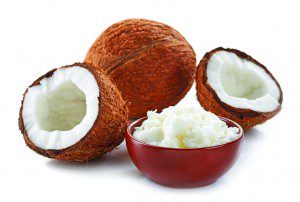 It seems like you can’t turn on the TV or open a women’s magazine without seeing or hearing something about the healthful benefits of coconut milk, coconut water, coconut sugar or even coconut oil. Proponents of coconut claim it is the latest super food, curing everything from Alzheimer’s disease to dry skin and heart disease.
It seems like you can’t turn on the TV or open a women’s magazine without seeing or hearing something about the healthful benefits of coconut milk, coconut water, coconut sugar or even coconut oil. Proponents of coconut claim it is the latest super food, curing everything from Alzheimer’s disease to dry skin and heart disease.
Starbucks has even offered it up as a healthy – vegan – alternative to skim milk. But is it really healthy? Are there unrecognized health benefits?
It depends.
On the Pro Coconut Side
Coconut advocates, while acknowledging that the oil is high in saturated fats, argue that it contains unusually healthy fats known as medium-chain fatty acids (lauric acid). They say the body uses lauric acid differently than most other fats, being quickly processed by the liver and converted into energy by the body’s cells. Two studies suggest that medium chain fatty acids may be beneficial for weight loss.
Proponents argue that coconut oil has antioxidant and antimicrobial benefits, containing compounds shown to prevent or fight certain viral, bacterial, and fungal infections, such as the flu, bronchitis, yeast infections, acne, and more. Additionally, coconut oil, particularly unrefined or virgin coconut oil, contains phenolic compounds that may offer health-protective, antioxidant properties.
Other claims include that coconut oil can reduce the body’s need for vitamin E; boost the immune system; support liver health; and has been linked to increases in both good (HDL) and bad (LDL) cholesterol levels. As such, coconut oil may have slightly beneficial effect on cholesterol when used in place of other saturated and trans fats.
The Con Side
Those who are looking at coconuts with a little more skepticism like to point out that every few years (or less), there tends to be a “new” superfood that is all the range. Quinoa … pomegranate … even yogurt at had a starring role as the latest superfood. It’s human nature to look for a quick and easy fix to what ails us.
But it’s usually too good to be true. Especially, they say, for people with high cholesterol or a history of heart disease. People with these conditions should avoid coconut because it raises cholesterol levels (both good and bad), putting them at increased risk for worsening heart disease.
If you’re trying to manage your diet and have turned to coconut as a superfood, you should be aware that it is very high in saturated fat. Olive oil, which plays a prominent role in the heart-healthy Mediterranean diet, has only about 2 grams of saturated fat per tablespoon. Coconut oil has 12.
Although Starbucks is offering coconut milk as a vegan alternative to dairy, the fact that it is plant-based does not make it healthier. A cup of coconut milk has 552 calories and 51 grams of saturated fat! By comparison, a cup of whole milk has 146 calories and 4.5 grams of saturated fat..
Whichever way you go
If you want to get in on the coconut craze, it’s OK for all but those at risk. Foods containing coconut can be healthful. But, as in all things, knowledge, moderation and reasonable expectations are the key. Know what you are consuming and watch out for the added calories and fat. You will want to make adjustments in your diet elsewhere, otherwise, there’s a good chance your waistline will go nuts.









